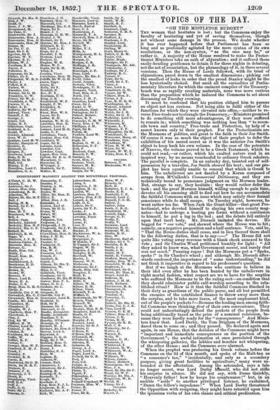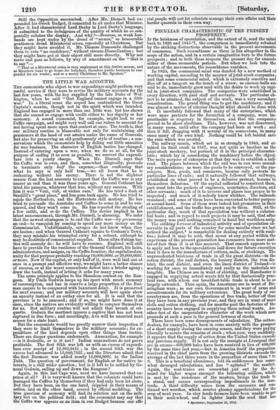TOPICS OF THE DAY.
" OH THE MISTLETOE BUDGET!"
THE woman that hesitates is lost ; but the Commons enjoy the faculty of hesitating and yet of saving themselves, though not without some damage in the process. We doubt whether it has ever happened before that Parliament has been so long and so profoundly agitated by the mere syntax of its own resolutions, or the non-syntax, " as the case may be," or rather is. A majority of the House resolved to make the Protec- tionist Ministers take an oath of abjuration • and it suffered those easily-bending gentlemen to detain it for three nights in debating, not the act of recantation, but the phraseology of it, in three several versions. Then the House of Lords followed, with its triad of abjurations, pared down to the smallest dimensions ; picking out the smallest of leeks in order that the proud Stanley might be the less hysterically choked. But amid all the curiosities of Parlia- mentary literature for which the eminent compiler of the Treasury- bench was so rapidly creating materials, none was more curious than the proposition which he induced the Commons to set about discussing on Tuesday evening. It must be confessed that his position obliged him to pursue an object not less curious. Not being able to fulfil either of the functions for which they were elevated into office,—neither to re- verse Free-trade nor to strangle the Democracy,—Ministers promised to do something still more advantageous, if they were suffered to remain in; which something was nothing less than " to recon- cile town and country," Free-trade and Protection, by help of a secret known only to their prophet. For the Protectionists are the Mormons of politics, and great is the faith in their Joe Smith. Of course it was as much the object of their prophet to defer the exhibition of his sacred secret as it was the anterior Joe Smith's object to keep back his own volume. In the case of the potentate of Nauvoo, the volume proved to be a Greek Testament, which he could not read,—or rather, which his exalted nature read in an inspired way, by no means vouchsafed to ordinary Greek scholars. The parallel is complete. In an unlucky day, taunted out of self- possession by a traveller, Joe Smith showed his text ; and our pro- phet has been equally unable to conceal that which is Greek to him. The unbelievers are not dazzled by a Koran composed of scraps from M'Culloch's Commercial Dictionary, and they are technically bound to pronounce judgment on the Mormon leader. But, strange to say, they hesitate : they would rather defer the task ; and the great Mormon himself, willing enough to gain time, devotes all his amusing skill to find out how he can accommodate the faithful Commons with an issue which may satisfy their formal conscience while he shall escape. On Tuesday night, however, he Went rather too far. When Jack the Giant-killer—that great Pro- tectionist, who devoted himself to slaying his own county mag- nates—had to undergo a beating pro forma without a conclusion to himself, he put a log in the bed ; and the debate fell entirely upon that inert body. Mr. Disraeli imitated the device. He begged for " one vote," and showed where the House was to hit ; namely, on a negative proposition and a half-sentence. Vote, said he, " That the House-duties shall cease, and in lieu thereof there shall be the following duties, that is to say—" The House did not quite like voting away revenue with a blank check annexed to the vote ' • and Sir Charles Wood petitioned humbly for light : " All they asked to know was, what Government meant, and surely that was not much." Punning rogue ! But the Mormons put a " Spoke, spoke !" in Sir Charles's wheel ; and although Mr. Disraeli after- wards confessed,the importance of " some understanding," he did not think it imperative in regard to his predecessor's question. But if we laugh at the Mormons who continue to believe in their idol even after he has been hunted by the unbelievers in right mortal fashion, what respect are we to have for the sceptics who suffered the Mormons to be the ruling sect-L–on condition that they should administer public calf-worship according to the esta- blished ritual ? How is it that the faithful Commons flinched in their duty as guardians of the public purse, and all but permitted the enemies of the established finance to &ow away more than the surplus, and to take more taxes, of the most unpleasant kind, out of the people's pockets P—Because the leading men among faith- ful Commons were thinking first of their own convenience. They could not unhesitatingly defend the pockets of the people from being additionally taxed as the price of a nominal remission, be- cause they were hardly ready for the "consequences." And Minis- ters knew that. Lord Derby, the Tom Brigham of the Mormons, dared them to come on; they paused. He declared again and again, in one House, tat the decision of the Commons might have " important and immediate conseluences on the position of the Government "; the awful intimation at once percolated through the whispering galleries, the lobbies and benches not whispering, of the other House ; and the Commons were alarmed.
When the prophet was producing his Greek volume before the Commons on the 3d of this month, and spoke of the Malt-tax as " a consumer's tax," " incidentally, and only as a secondary purpose, giving great facilities to agriculture," many were as- tounded at the affectation. Among the astounded, says a tale no longer secret, was Lord Derby himself, who did not stifle his surprise in silence. He did not say, with Dame Quickly, "Heavenly father! how he keeps his countenance !" but, in an audible " aside " to another privileged listener, he exclaimed, "Damn the fellow's impudence ! When Lord Derby threatened the Opposition with resigning, they might have retorted upon him the ipsissima verbs of his own classic and critical predication.
Still the Opposition succumbed. After Mr. Disraeli had-ex- pounded his Greek Bridget, it consented to sit under that Minister. After it had characterized Lord Derby in Lord Derby's language, it submitted to the indulgence of the quality of which he so con- genially relishes the display. And why ?—Because, as weak hus- bands are kept under by the dread of "scenes," so honourable gentlemen dread Ministerial crises, especially at Christmas. But they might have avoided it. Mr. Thomas Duncombe challenged them to vote "no confidence," without oircum-Disraelization ; but they might have got at their object still more directly. Why not move and pass as follows,. by way of amendment on the " that is to say"— "That as a Ministerial crisis is very unpleasant at this festive season, and as Members want to go home for holydays, therefore public business be sus- pended for six weeks ; and so a merry Christmas to Mr. Speaker."



































 Previous page
Previous page